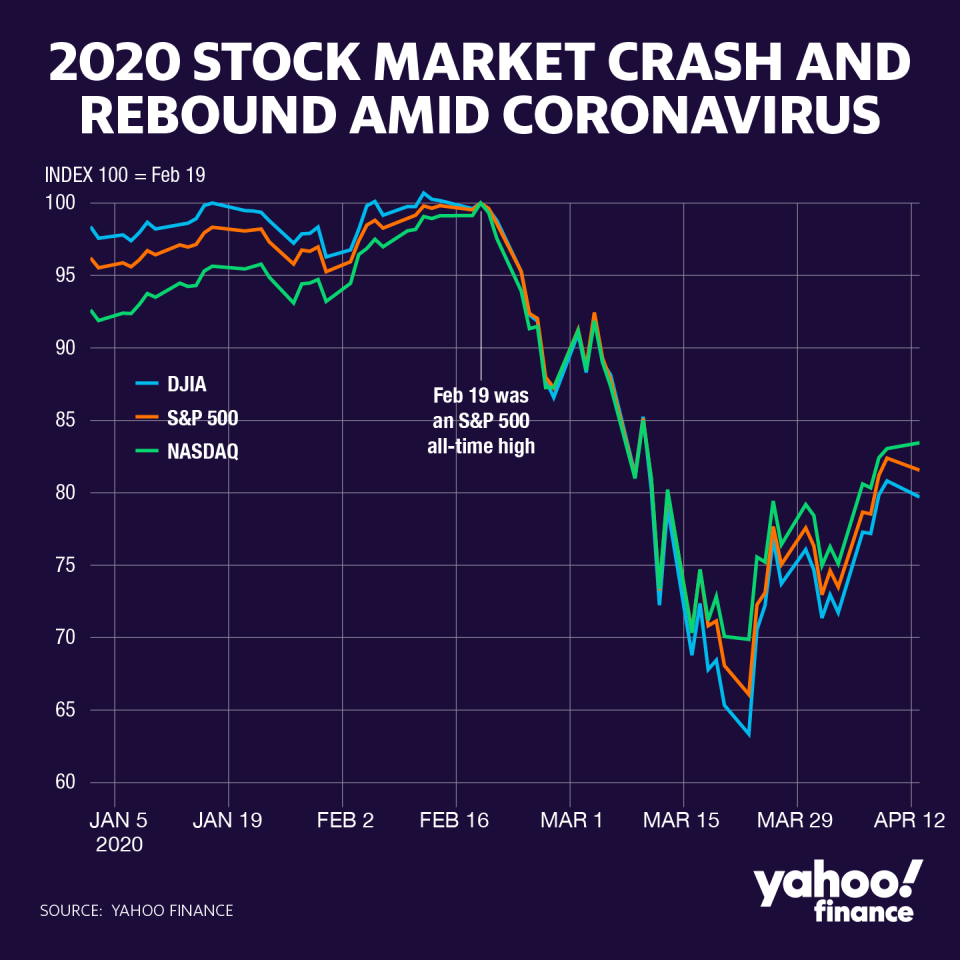Tuesday marks the beginning of a weird earnings season
Earnings season is underway, and it’s off to a weird start.
Johnson & Johnson (JNJ), JPMorgan Chase (JPM), Wells Fargo (WFC), and Fastenal (FAST) were among big companies announcing first quarter results on Tuesday.
All four companies confirmed that the coronavirus pandemic is a negative for earnings. And yet shares of J&J and Fastenal are rallying on the news. (After an initial pop, the bank stocks were lower in early afternoon trading.)
Given the market reaction, one can speculate that what these companies said about their earnings and the outlook wasn’t much worse than what investors and traders expected. Because as investors know, bad news can send stocks higher if the market was expecting worse.
But a one-day rally in any stock doesn’t mean things suddenly look rosy. These names are still well off recent highs as the market continues to price in the fact that the business environment is worse today than it was before the coronavirus pandemic. As you can see from the chart below, this is the case for the stock market in aggregate.

Forget about consensus estimates. They’re stale.
One thing we’re not talking about right now is how these companies’ Q1 results performed against analysts’ expectations.
That’s because analysts expectations have been very low quality, and the dispersion of estimates has been so wide that average estimates don’t make a whole lot of sense.
Furthermore, we know that a lot of the analysts’ estimates that go into these consensus expectations haven’t been updated since before the coronavirus outbreak evolved into a global economic crisis. This has been due to the utter lack of visibility. In other words, many of these estimates are inflated by the mere fact that they have not been updated.
“While many analysts were hamstrung by uncertainty and the lack of management guidance for much of the last several weeks, revisions have been accelerating ahead of earnings reports,” Goldman Sachs’ David Kostin wrote on Monday. “Nonetheless, we believe they remain too high.”
In other words, you may find a lot of companies reporting Q1 revenue and earnings that “missed” estimates, but shares rallied anyways because the market was already expecting worse.
Keep an eye on the details
This time around, investors will be less interested on whether sales and earnings “beat” or “missed” expectations. Rather, they’ll be more interested on what details emerge, including those one-time, non-recurring items that often get adjusted out.
“Earnings results will be even worse than we forecast if company managements decide to recognize charges and write-downs during a quarter that many investors accept will be very negative,“ Kostin said.
Right on cue, JPMorgan and Wells Fargo revealed massive charges in the form of $6.8 billion and $4 billion, respectively, set aside for expected loan losses.
This information is valuable, not just for JPMorgan and Wells Fargo shareholders, but anyone else seeking insight from the lenders on the front lines of business. Economists, investment strategists, financial advisers and even policymakers may find this kind of color useful in their decision-making as they assess how much COVID-19 is damaging the economy.
Expect guidance, thanks to the SEC
Additionally, any forward-looking guidance will matter, especially considering the extremely limited amount of guidance being provided by business leaders.
In fact, the Securities and Exchange Commission (SEC) is pressuring companies to share what they can regarding how the coronavirus is affecting business.
“The Division encourages disclosure that is tailored and provides material information about the impact of COVID-19 to investors and market participants,” the SEC wrote on March 25. “We also encourage companies to provide disclosures that allow investors to evaluate the current and expected impact of COVID-19 through the eyes of management, and that companies proactively revise and update disclosures as facts and circumstances change.”
It’s no surprise to hear Johnson & Johnson discuss COVID-19 as its consumer business has been “positively impacted by the increased demand,” while its pharma business works toward a COVID-19 vaccine.
But when Fastenal says, “Our safety business grew 31.0% on a daily basis as we were able to source and deliver critical personal protective equipment ('PPE') supplies to the marketplace,” some investors may be surprised to see positive coronavirus impacts away from the health-care and stay-at-home trades.
“Q1 earnings reports and management conference calls will not be a ‘shrug of the shoulders’ exercise that markets can ignore as they wait for the dust to settle,” DataTrek co-found Nick Colas wrote on Tuesday.
“[T]he SEC is clearly telling companies they expect them to cover all relevant issues (not just earnings/guidance).”
Head to SEC.gov for a lengthy list of what the SEC wants to see from companies.
[See Also: 20 stock investing tips for beginners]
—
Sam Ro is managing editor at Yahoo Finance. Follow him on Twitter: @SamRo
Read more:
'We are all in the dark': Wall Street's smartest are making guesstimates
Why Warren Buffett’s 2008 message to investors was perfectly timed
Why a big market rally right now is no reason to get excited
Find live stock market quotes and the latest business and finance news
For tutorials and information on investing and trading stocks, check out Cashay
Follow Yahoo Finance on Twitter, Facebook, Instagram, Flipboard, LinkedIn, and reddit.